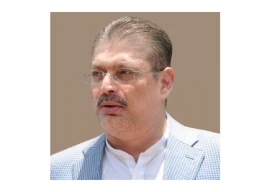
Khalid Mehmood, 35, who runs a jewellery shop in Khanpur, told The Express Tribune that he inherited his prized possessions from his forefathers who were in the business of making gold and silver jewellery for over a century.
“Initially these coins and medals were of little interest to me but gradually my love for them developed, especially after seeing my father taking extraordinary care of these things,” he said.
The jeweller has even offered to donate his treasure to a museum if their proper preservation and protection is guaranteed.
Displaying a thumb size stamp after kissing it as a gesture of respect, Mehmood claimed it was the same stamp that the Holy Prophet Muhammad (pbuh) used for official correspondence during his stay in Madina. The name of the Holy Prophet (pbuh) is visible on the oval shaped stamp which is made of copper and measures 1x1 inches.
Mehmood also owns a silver coin with the name of Imam Musa Reza etched on one side and the Kalima on the other. His collection also features three silver coins and the currency used during the different eras of Mughal emperors.
Mehmood also owns colonial-era coins from 1835 till the Second World War. He says he also owns silver coins with the denomination of a single dollar used in America, Canada and Australia about 90 years back.
Medals conferred on kings and high-ranking personalities are also included in Mehmood’s collection.
The jeweller had gifted some of the Islamic coins to Saudi Ambassador to Pakistan Abdul Aziz Ibrahim during a recent visit to his office.
He said the motivation behind collecting antique coins and other historically valuable items is purely derived from his passion.
Mehmood said that he is aware of the historical and monetary value of the coins but the thought of selling them never occurred to him even though he inherited them at a time when money was tight and problems were plenty.
He also rejected the impression that he or his forefathers had purchased or collected the coins as an investment, reiterating that it would have earned him a fortune had he sold them in Pakistan or overseas.
Mehmood said that he was willing to offer his collection to the Museum of Hazara University if he was assured in writing that it would remain secure and not be neglected like so many other pieces of antiquities in some museums across the country. Edited by Shayan Naveed
Published in The Express Tribune, October 11th, 2012.
COMMENTS (4)
Comments are moderated and generally will be posted if they are on-topic and not abusive.
For more information, please see our Comments FAQ



1725612926-0/Tribune-Pic-(8)1725612926-0-165x106.webp)













Judging by Farsi script on the coins, it appears that their origin is Persia after its invasion by the Arabs.
The jeweler is quite wrong in this instance. The earliest coin bearing the shahada was minted during the reign of Abbassid caliph Abd'al Malik around 77Hijra/ 690sA.D., which is much much later than the reported year of death of the prophet.
Source: Islamic History Through Coins by Jere L. Bacharach
With all due respect, this is one of the most widely available 'antique' coins available these days.. Ebay is full of them.. First of all they are not that old.. 90% of them are from Mughal era and from multiple princely states of India and Persia.
I have exactly similar coins (a few thousands of them) which I bought as a large lot from an Indian seller and had them verified and catalogued in Singapore through an authorised dealer.
They are not "very expensive". One can still find many coin lots that work out to be not more than a few dollars for each coin.
Try searching for them online.. My whole collection with identical and many older coins was valued at a few thousand dollars.